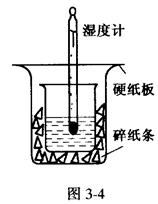影响钢水氧含量的因素有哪些?
参考答案:
吹炼终点钢水氧含量也称为钢水的氧化性。钢水氧化性对钢的质量、合金吸收率以及对沸腾钢的脱氧,都有重要的影响。
影响钢水氧含量的因素主要有:
(1)钢中氧含量主要受碳含量控制。碳含量高,氧含量就低;碳含量低时,氧含量相应就高;它们服从碳—氧平衡规律。
(2)钢水中的余锰含量也影响钢中氧含量。在ω〔c〕<0.1%时,锰对氧化性的影响比较明显,余锰含量高,钢中氧含量会降低。
(3)钢水温度高,增加钢水酌氧含量。
(4)操作工艺对钢水的氧含量也有影响。例如高枪位,或低氧压,熔池搅拌减弱,将增加钢水的氧含量,当ω〔c〕<0.15%时,进行补吹会增加钢水氧含量;拉碳前,加铁矿石或氧化铁皮等调温剂,也会增加钢水氧含量。因此,钢水要获得正常的氧含量,首先应该稳定吹炼操作。


 ,中和后生成溶液的比热容为C J/(g.℃)反应前的温度为18℃,反应后最高温度为t℃,则中和热的计算式是△H=________________________。
,中和后生成溶液的比热容为C J/(g.℃)反应前的温度为18℃,反应后最高温度为t℃,则中和热的计算式是△H=________________________。